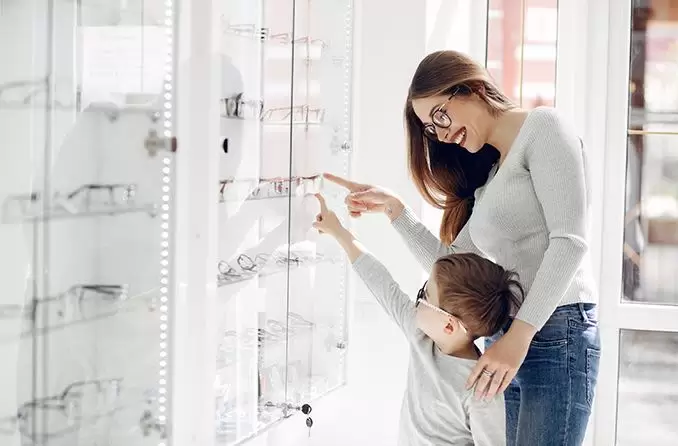
Optical glasses are tools used to improve the eyesight. They help to send the correct image to the retina by focusing the light properly through special lenses. Glasses can also be used to protect against harmful UV rays and protect the eyes from damage.
Optical glasses provide an effective solution for many vision problems:
Myopia (Weak Far Sight):
People with myopia cannot see far away, but close objects are clearly visible. Concave lenses with negative diopter power are used in this type of glasses. These lenses diffuse light into the eye and ensure that light rays are properly focused on the retina.
Hypermetropia (nearsightedness):
People with hypermetropia see far away well, but close objects appear blurry. Convex lenses with positive diopter power are used in glasses. These lenses focus the light rays on the retina by concentrating them at a narrow angle.
Astigmatism:
Astigmatism causes blurred vision at both near and far distances. Glasses designed for astigmatism use cylindrical lenses. These lenses help the light to focus properly on the different meridians of the eye, thus correcting blurred vision.
Presbyopia (Age-Related Nearsightedness):
Presbyopia is an age-related decrease in the eye's ability to focus on near objects. Bifocal or progressive lenses are used for presbyopia. Bifocal lenses offer two different diopter powers - one for near vision and one for distance vision. Progressive lenses, on the other hand, provide gradually changing diopter power for near, intermediate and far distances.
1. Referral to an ophthalmologist
Prescribing optical glasses begins with a consultation with an eye specialist (optometrist or ophthalmologist). Visiting an ophthalmologist is important for accurate diagnosis and proper treatment of vision problems.
2. Vision Complaints
The specialist first studies your vision history and complaints. At this stage, the following questions are answered:
- When did vision problems start?
- Is there a problem with both eyes?
- Do you have eye pain, headache or other symptoms?
- Have you used glasses before?
3. Vision Tests
Your eye doctor performs a series of vision tests. These tests are used to determine the exact condition of your vision. The main vision tests are:
Visiometry: This test is used to check your distance and near vision. Both eyes are examined separately using a standard spectacle plate.
Refraction Test: This test is used to measure how the eye bends light (refraction). In this test, different lens powers are changed in your eye to determine which lens power improves vision the most.
Autorefractometry: This test measures the refractive properties of your eye using an automated device. Autorefractometry provides quick and accurate results and makes your doctor's job easier.
Keratometry: This test is used to measure the curvature of the front surface of the eye. This measurement is important for identifying astigmatism and other vision problems.
Intraocular Pressure Measurement (Tonometry): This test is used to measure the pressure inside the eye and helps in the early diagnosis of glaucoma.
When choosing optical glasses, it is important to pay attention to the following points:
The Right Prescription: Choosing glasses that fit your doctor's prescription.
Comfortable Frame: Choosing a comfortable frame that fits the nose and ears.
Material: Lenses and frame are made of quality materials.
UV Protection: Choose lenses that provide protection against UV rays.
There are many myths about optical glasses, some of them are:
Wearing eyeglasses weakens the eyes: Actually, wearing glasses does not weaken the eyes.
Wearing eyeglasses cures the eyes: Glasses are an effective means of correcting vision problems, but they do not eliminate the root cause of the vision problem. Glasses provide images that are properly focused on the retina, providing clearer vision. However, surgical or other medical interventions may be required to treat the underlying issues of vision problems.
For the correct use of optical glasses, it is necessary to follow the following tips:
Regular Cleaning: Clean the glasses regularly with a special cloth.
Proper Storage: Always store the glasses in the protective case.
Correct Wearing: Wear the glasses correctly and take them off with both hands when taking them off.
Safety: Protect the glasses from hitting hard surfaces and bending.
2024-07-17
2024-02-14
2024-02-14
2024-06-12
2024-06-13
2024-06-13
2024-06-13
2024-06-14
2024-06-14
2024-06-14
2024-06-14
2024-06-14
2024-06-14
2024-07-31
2024-07-31
2024-07-31
2024-07-31
2024-08-09
2024-08-12
2024-08-28
2024-09-05
2024-09-06
2024-09-14
2024-09-19
2024-09-19
2024-10-01
2024-10-02
2024-10-07
2024-10-21
2024-10-23
2024-10-29
2024-11-12
2024-11-18
2024-11-21
2024-11-26
2024-11-28
2024-12-03
2024-12-06
2024-12-10